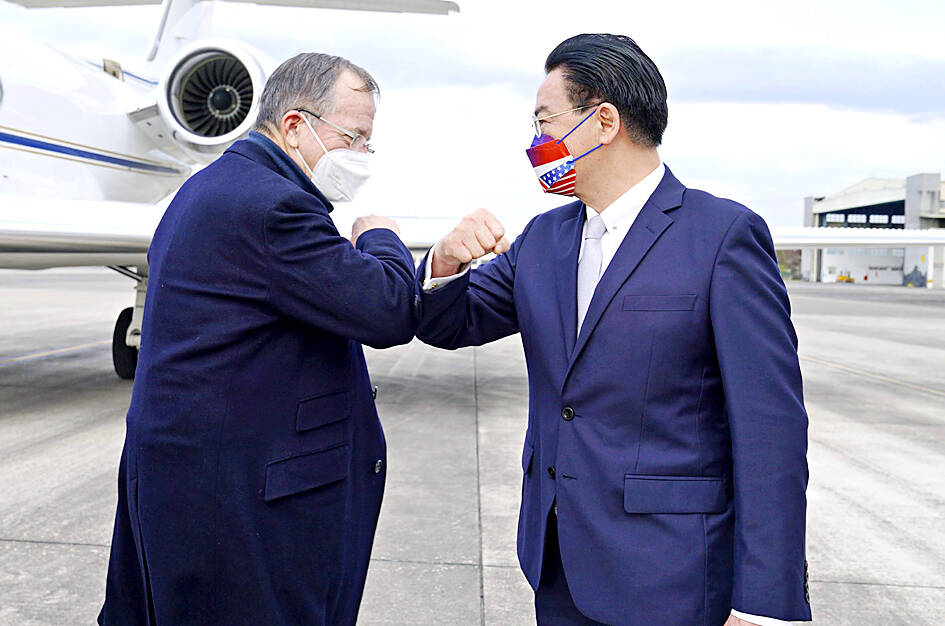The Ministry of Foreign Affairs (MOFA) has proposed a budget of NT$30.4 billion (US$993.6 million) for fiscal 2023, an increase of NT$1.52 billion from this year, due to an increase in planned international exchanges, the ministry said in its budget report to the Legislative Yuan.
The ministry laid out plans for more international collaboration, as well as greater participation in international conferences and exchanges — the latter seeing an increase of NT$176 million in projected spending for a total of NT$2.14 billion.
The money would go toward participation in international organizations, the hosting of and participation in international exchanges, and the hosting and reception of international dignitaries, the report said.

Photo: AP
The ministry expects to host 2,368 meetings with foreign guests next year — 304 more than this year.
The planned meetings would involve 185 visits from Africa, 420 visits from the Asia-Pacific region, 444 visits from Europe, 843 visits from the US or Canada, and 253 visits from Central and South America.
The ministry also plans to host 38 people from UN-affiliated organizations, eight from the WTO, 135 from international media, 34 representatives of foreign non-governmental organizations, and eight on visits related to improving the nation’s information-security infrastructure.
The budget for visiting dignitaries would be spent on airline tickets, meals and accommodation, transportation within Taiwan, insurance and other related costs, it said.
The budget for cooperation with and assistance for foreign countries would account for NT$14.43 billion — roughly half of the proposed budget and an increase of NT$1.75 billion over this year.
New areas of spending in this field would include projects with Lithuania, Slovakia, the Czech Republic and other countries on bolstering democratic resilience, as well as training semiconductor talent.
A total of NT$2.1 billion has been allocated for international aid and reconstruction assistance in response to major disasters.
The ministry has proposed a special budget of NT$1.8 billion to assist Ukraine with refugee resettlement and post-war recovery.
In related news, the Cabinet’s Ill-gotten Party Assets Settlement Committee has submitted a budget of NT$51.67 million for next year — a decrease of NT$460,000 from this year.
The committee submitted its budget last week alongside other government bodies, ahead of a legislative review, which is to take place this month.
The committee’s proposed budget comprises NT$38.68 million for general administrative expenses, NT$11.56 million for handling ill-gotten party assets it finds in its investigations, a reserve fund of NT$400,000, an overseas travel budget of NT$425,000 and a budget of NT$600,000 for incentives to aid investigations.
The committee said it plans to visit countries in Europe next year to “observe how other countries have dealt with ill-gotten party assets, and how they have promoted transitional justice efforts.”
It said it would “learn from the experiences of governments and civic organizations in different countries and their design of laws and implementation of policies related to” the issues.
Each country in Europe handled its democratization process differently, so it would be useful to observe those differences and learn from them, it said.
The proposed budget includes NT$600,000 for incentives to help the committee investigate ill-gotten party assets, which it said is in accordance with Article 13 of the Act Governing the Settlement of Ill-gotten Properties by Political Parties and Their Affiliate Organizations (政黨及其附隨組織不當取得財產處理條例).
The committee from January to June investigated 15 cases following tip-offs from whistle-blowers and petitions, Executive Yuan data showed.

Alain Robert, known as the "French Spider-Man," praised Alex Honnold as exceptionally well-prepared after the US climber completed a free solo ascent of Taipei 101 yesterday. Robert said Honnold's ascent of the 508m-tall skyscraper in just more than one-and-a-half hours without using safety ropes or equipment was a remarkable achievement. "This is my life," he said in an interview conducted in French, adding that he liked the feeling of being "on the edge of danger." The 63-year-old Frenchman climbed Taipei 101 using ropes in December 2004, taking about four hours to reach the top. On a one-to-10 scale of difficulty, Robert said Taipei 101

Nipah virus infection is to be officially listed as a category 5 notifiable infectious disease in Taiwan in March, while clinical treatment guidelines are being formulated, the Centers for Disease Control (CDC) said yesterday. With Nipah infections being reported in other countries and considering its relatively high fatality rate, the centers on Jan. 16 announced that it would be listed as a notifiable infectious disease to bolster the nation’s systematic early warning system and increase public awareness, the CDC said. Bangladesh reported four fatal cases last year in separate districts, with three linked to raw date palm sap consumption, CDC Epidemic Intelligence

Two Taiwanese prosecutors were questioned by Chinese security personnel at their hotel during a trip to China’s Henan Province this month, the Mainland Affairs Council (MAC) said yesterday. The officers had personal information on the prosecutors, including “when they were assigned to their posts, their work locations and job titles,” MAC Deputy Minister and spokesman Liang Wen-chieh (梁文傑) said. On top of asking about their agencies and positions, the officers also questioned the prosecutors about the Cross-Strait Joint Crime-Fighting and Judicial Mutual Assistance Agreement, a pact that serves as the framework for Taiwan-China cooperation on combating crime and providing judicial assistance, Liang

US climber Alex Honnold left Taiwan this morning a day after completing a free-solo ascent of Taipei 101, a feat that drew cheers from onlookers and gained widespread international attention. Honnold yesterday scaled the 101-story skyscraper without a rope or safety harness. The climb — the highest urban free-solo ascent ever attempted — took just more than 90 minutes and was streamed live on Netflix. It was covered by major international news outlets including CNN, the New York Times, the Guardian and the Wall Street Journal. As Honnold prepared to leave Taiwan today, he attracted a crowd when he and his wife, Sanni,